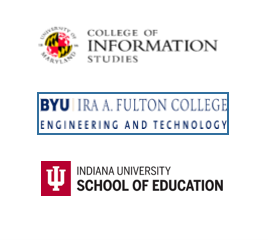COVID-19
March brought the pandemic to our project as the news reports of a mystery illness from February led to rapid cancellations of in-person classes and restrictions on traditional face-to-face research activities. The project was in the process of planning some play-testing of the first phase of the cybersecurity narrative and this led to some changes in our protocol for working with human subjects in a virtual mode.
Conducting Online-playtesting
The project was preparing to playtest the first phase of the cybersecurity module and so new procedures needed to be developed to allow students to play over the web what they would have done in person. The in-person playtesting and co-design sessions often involve students gathering around a conference table with a whiteboard, large pads, and sticky notes to share experiences and brainstorm ideas. These artifacts are then collected, digitized, and analyzed. These processes had to be recreated using the Zoom video conferencing system. New protocols needed be developed and submitted to the University of Maryland Institutional Review Board that is coordinating human subject procedures across the three institutions. Figure 1 is an illustration of both the background materials presented to students (a-c) and of the playtest being conducted in Zoom.
a) Collaboration activity

b) Introducing the fictional community

c) Introducing roles

d) Focus group with participants pixelated

Figure 1 – Images from the online playtesting
Where is Bronze Falls
| The fictional community that is the setting for these research innovations is being created with particular properties to support the learning goals and playability of these narratives. The name “Bronze Falls” was first used by a team of graduate students in Phil Piety’s class for a fictional final project town. The name is based on the real town Silver Spring near campus where many students and faculty live. However, the fictional town that this game is based needs to have certain properties to support its different versions and so initially a number of different Washington DC suburban areas were viewed as providing the right kinds of resources that could support the game. As this work unfolded, the project began to see the need to find a real community as a model that could be adapted to the purposes in this game. A Midwestern college town was selected and public information about it is being used to “seed” our fictional model community. |
Seeing Disaster Response as Relevant
The COVID-19 circumstances have led the project team to realize the relevance of our community perspective and crisis response module. The community model we are developing could be used to support a public health variation where individuals could be educated about and trained on responding to outbreaks in a local community. As other researchers are beginning to see the work we are doing as potentially compatible with their research programs, different versions of the Careers In Play program have been discussed and a version related to an epidemic and community transmission seems achievable.
Andy Fellows – The Mayor of Bronze Falls
The project team is fortunate to have Andy Fellows leading the team developing the community model. While he may be called the “Mayor of Bronze Falls,” Andy was actually the elected Mayor of College Park, Maryland where the University of Maryland is situated. Andy has a background in urban planning and public policy. He came to the iSchool Studies as the Community Outreach Program Manager after decades of experience in non-profit advocacy, local government, and grassroots community development. He holds a joint appointment between the iSchool and the Center for Smart Growth. An advocate for sensible transportation policies, Andy is frequently involved in efforts to make the University of Maryland more accessible to diverse populations.

Figure 2 – Andy Fellows
Careers In Play Leadership Team
Phil Piety, PhD. University of Maryland iSchool (PI and Learning Analytics). ppiety@umd.edu
Beth Bonsignore PhD. University of Maryland iSchool (Co-PI and Design-based Research), ebonsign@umd.edu
Derek Hansen, PhD.Brigham Young University (Co-PI and Game Technology). dlhansen@byu.edu
Dan Hickey, PhD. Indiana University School of Education (Co-PI, Learning Theory and Assessments). dthickey@umd.edu
